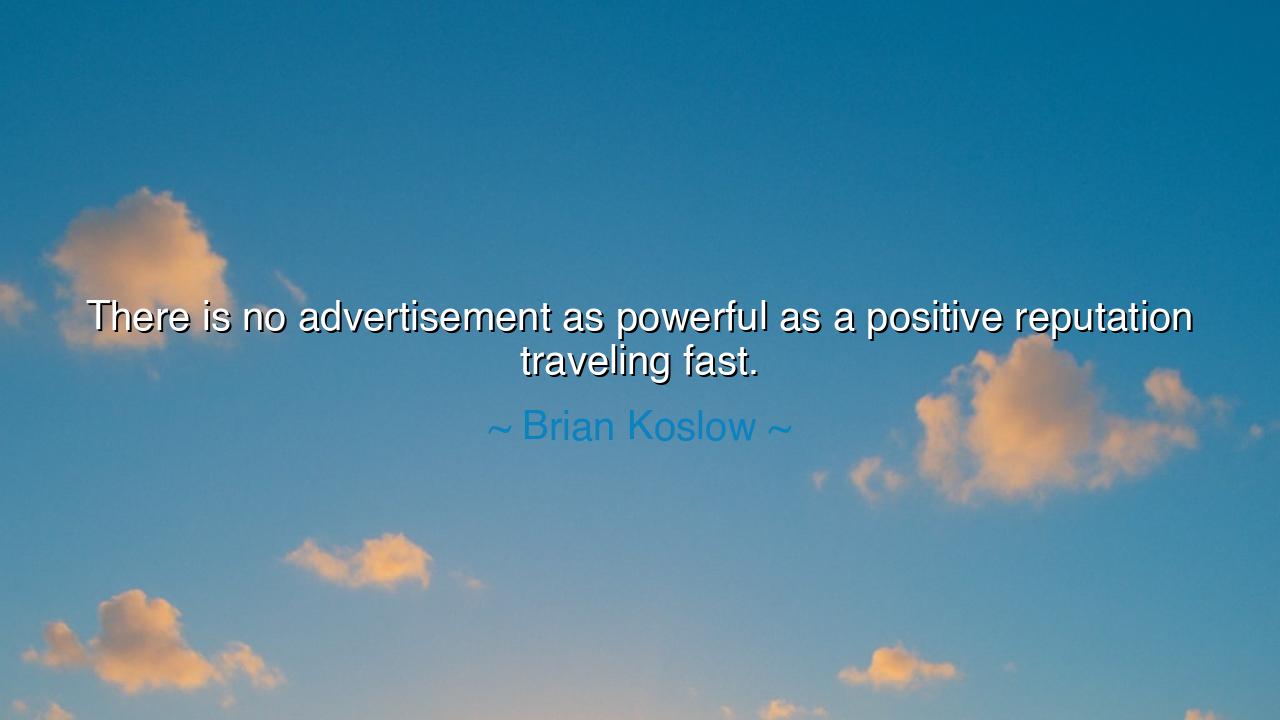
There is no advertisement as powerful as a positive reputation






Hear, O seekers of honor, the words of Brian Koslow, who declared: “There is no advertisement as powerful as a positive reputation traveling fast.” In these words lies a timeless truth: that no banner, no coin, no clever phrase can surpass the strength of a good name. For when men and women speak well of you, when your deeds shine brighter than your boasts, their voices carry your fame farther than any proclamation. A positive reputation is the crown earned not by wealth or lineage, but by integrity, service, and consistency.
The meaning of this saying is clear: what you are known for is more powerful than what you say about yourself. A reputation is forged in silence, hammered in the secret places of action, where the eyes of the world may not yet be watching. But once your deeds escape into the world, they grow wings. They fly from mouth to mouth, from city to city, and soon, like fire carried by the wind, they light up the world. A man may spend a fortune on advertisement, but one act of kindness, courage, or honor will speak louder than gold.
The origin of this truth is as old as humanity. In ancient markets, merchants did not rely on painted signs or scrolls, but on the voices of their customers. Those who dealt honestly were praised, and their stalls flourished; those who cheated were shunned, and their names became curses. In kingdoms, rulers who governed with justice were loved, and their reputation brought them loyalty even beyond their borders; while tyrants, though mighty in arms, found their name despised, their legacies crumbling as whispers of cruelty traveled faster than armies.
Consider the story of Abraham Lincoln, who rose from obscurity not by wealth or advertisement, but by reputation. Known as “Honest Abe,” his integrity as a lawyer became his greatest treasure. Clients trusted him, opponents respected him, and common folk believed his word above the words of others. That positive reputation traveled swiftly, carrying him from log cabin to White House. It was not riches that lifted him, but the echo of honesty spoken by many mouths.
Mark also the tale of Florence Nightingale, the “Lady with the Lamp.” She sought no advertisement, no glory, but her tireless service to the wounded during war gave her a reputation that spread like light across nations. Soldiers spoke of her with reverence, the sick remembered her with gratitude, and soon the world hailed her as the mother of modern nursing. Her reputation became her message, more powerful than any pamphlet or speech, for it was born of sacrifice and compassion.
O children of tomorrow, take heed: your reputation is being written each day by your actions. Every word, every choice, every deed is a thread in the fabric of how others will remember you. Guard it well, for once torn, it is hard to mend; but once woven with honor, it will clothe you in strength beyond measure. Do not chase empty praise, but let your actions be so steadfast that praise chases you.
Practical wisdom calls you: keep your promises, even when they cost you. Speak truth, even when it is hard. Treat others with fairness, even when none are watching. For in these simple acts, your positive reputation is built. And once it begins to travel—through friends, colleagues, communities—it will open doors no wealth could purchase and win battles no army could secure.
So remember Koslow’s words: “There is no advertisement as powerful as a positive reputation traveling fast.” Strive each day to live so that your name, when spoken, brings to mind honor, kindness, and trust. For fame fades, wealth diminishes, but a reputation of goodness endures, echoing through time, inspiring generations yet unborn. Let your life itself be the message, and your reputation the flame that carries it across the world.
––






HHhue hue
This statement sparks curiosity about the psychology behind human behavior. Why does a positive reputation resonate so strongly compared to conventional advertising? Is it because people inherently trust peer opinions more than promotional messages? I also think about the practical implications: how can organizations measure the impact of reputation, and can reputation alone drive growth without supporting products or services? Finally, is it possible to create a long-lasting reputation in a world saturated with information?
TVThanh Vu
Reading this, I feel compelled to examine my own personal or professional reputation. Does the quote imply that the speed of information circulation is as important as the quality of reputation itself? How much does context matter—could a positive reputation in one community be ignored or misunderstood in another? I also wonder about ethical considerations: should people focus on genuinely positive actions, or can strategic perception management achieve the same effect?
GVGiap Vu
I find this perspective fascinating because it emphasizes trust over marketing tactics. But I question whether a reputation can truly outweigh aggressive advertising campaigns in competitive industries. What role do reviews, word-of-mouth, and digital influence play in amplifying or undermining such a reputation? Also, can negative reputations reverse the effect of a strong positive one, and if so, how resilient is this kind of organic influence in the long run?
THThuy Hoang
This quote makes me think about how reputation functions in the age of social media. Is a positive reputation still more powerful than traditional advertising when news spreads instantly online? I also wonder about the effort it takes to build such a reputation—can small businesses or individuals realistically achieve this, or is it mostly reserved for those already visible? Finally, how do we maintain authenticity while intentionally cultivating a reputation that spreads quickly?